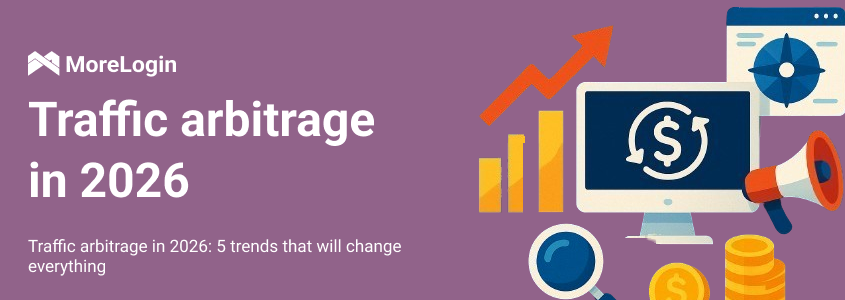
- Product

- Pricing
- Affiliate Program
- Use Cases
- Resource


Arbitrage traffic is changing rapidly. What worked in 2024 will be outdated by 2026: audiences are becoming lazier, advertising platforms stricter, and competition tougher. Governments are introducing new restrictions, major players are monopolizing niches, and artificial intelligence is replacing manual labor.
In such conditions, only those who manage to adapt will survive. This material outlines key trends and practical tips to help you stay afloat.
Users are reading long texts less and consuming more short-form video content. This applies to advertising as well: text-based teasers lose out to dynamic videos.
Platforms like TikTok, Reels, and YouTube Shorts are becoming primary traffic sources. Long-text landing pages are being replaced by interactive formats — mini-games, quizzes, storytelling in stories. Even in messengers, users prefer voice messages and video replies.
What to do?
Switch to video content. Vertical videos, voice-over narration, dynamic editing — this is the new standard. Test UGC formats (user-generated content) and interactive elements that keep attention.
By 2026, artificial intelligence will penetrate every stage of traffic arbitrage. Neural networks generate creatives, write ad copy, create images, and even edit videos. Automated systems analyze user behavior and optimize bids on their own, predicting CPL better than any media buyer.
Chatbots and voice assistants are replacing live operators, while AI analytics instantly identifies weak points in funnels. Manual work is becoming a thing of the past — even A/B testing is now handled by algorithms.
What to do?
Master AI tools. Use ChatGPT for copywriting, MidJourney for creatives, and automated bid managers for campaign optimization. The faster you delegate routine tasks to bots, the higher your profit margins will be.
Google and Meta are tightening moderation, banning "grey" offers, and requiring verification. Push notifications and teaser networks are overloaded with spam, causing CTR to drop. Even native traffic is becoming more expensive due to intense competition.
Meanwhile, new platforms are growing: Telegram channels, mobile apps, and metaverses. Users are spending more time in messengers rather than social media, and advertising there is still relatively cheap.
What to do?
Diversify your traffic sources. Test Telegram Ads, TikTok Native, and invite-only affiliate networks. Look for traffic where competition is still low.
Large arbitrage studios are no longer just hiring webmasters — they are building full-fledged business structures. They acquire top specialists, lobby for offers, and control entire verticals (loans, gambling, nutra).
Solo players and small teams find it increasingly difficult to compete: corporations have significantly larger testing budgets, and access to the best offers is often restricted.
What to do?
If you can’t beat them — join them. Join strong teams or partner with other arbitrage specialists. Alternatively, focus on narrow niches where competition is still low.
In Russia and the CIS, regulations are tightening: payment systems are being blocked, "questionable" offers are being banned, and advertising censorship is being introduced. Withdrawing funds is becoming more difficult due to sanctions and KYC checks.
Even cryptocurrencies are no longer a safe haven — governments are increasing control over exchanges.
Users are tired of generic ads that ignore their interests. In an age of information overload, it's not enough to grab attention — the content must be relevant. How does it work? Analytics tools study user behavior, search queries, views, and likes, then offer products and services tailored to those interests. Tools like DCO (Dynamic Creative Optimization), personalized offers, and deep audience segmentation are key. Brands are using AI to automate personalized ad creation, which boosts campaign effectiveness.
Every additional second of page load time can hurt conversion rates. A slow site drives users away — they’ll just go to a competitor. This is especially critical for mobile traffic, which now dominates most niches. What matters? Optimizing load speed, compressing images, using CDNs, and minimizing scripts. Clear navigation, responsive design, and effective CTAs (calls to action) also increase engagement and sales. Ideally, a landing page should load in under two seconds.
Traditional models (CPA, CPC, CPM) are losing effectiveness due to rising click costs and stronger competition. Brands are exploring new revenue streams by combining several formats. What's gaining traction? Subscription models, donations, paid content, and NFT platforms. In the gaming sector, in-app purchases and advertising are expanding rapidly. Arbitrage specialists are testing hybrid monetization schemes, including mixed payment models. A creative, experimental approach can lead to profitable niches.
Acquiring new customers is becoming more expensive. Reasons include higher ad rates, stricter moderation algorithms, and increased competition for attention. As a result, businesses are focusing more on customer retention than initial acquisition. What’s the strategy? Invest in LTV (lifetime value), encourage repeat purchases, and use personalized offers via CRM systems. Loyal customers are cheaper to retain than to acquire, making retention strategies crucial.
Blockchain, cryptocurrencies, and smart contracts are changing how traffic arbitrage works. Decentralized applications (dApps) allow you to earn bypassing traditional intermediaries. What shows promise? Crypto payments, tokenized monetization models, and blockchain-based affiliate programs. These tools offer flexible earning opportunities but require a solid understanding of the technology. Stay on top of trends and test innovative solutions to stay ahead of the market.
What to do?
Register foreign legal entities, use payment systems like Wise or Revolut. Explore GEOs with lighter regulation: Asia, Latin America, Africa.
Focus on video — text-based creatives no longer work.
Automate processes — manual campaign setup is becoming obsolete.
Look for alternative traffic sources — Google and Meta are losing effectiveness.
Join forces — competing with holding companies alone is nearly impossible.
Move into less regulated jurisdictions — regulations will only get stricter.
Traffic arbitrage in 2026 means playing by new rules. Those who adapt first will stay profitable. The rest will exit the market.